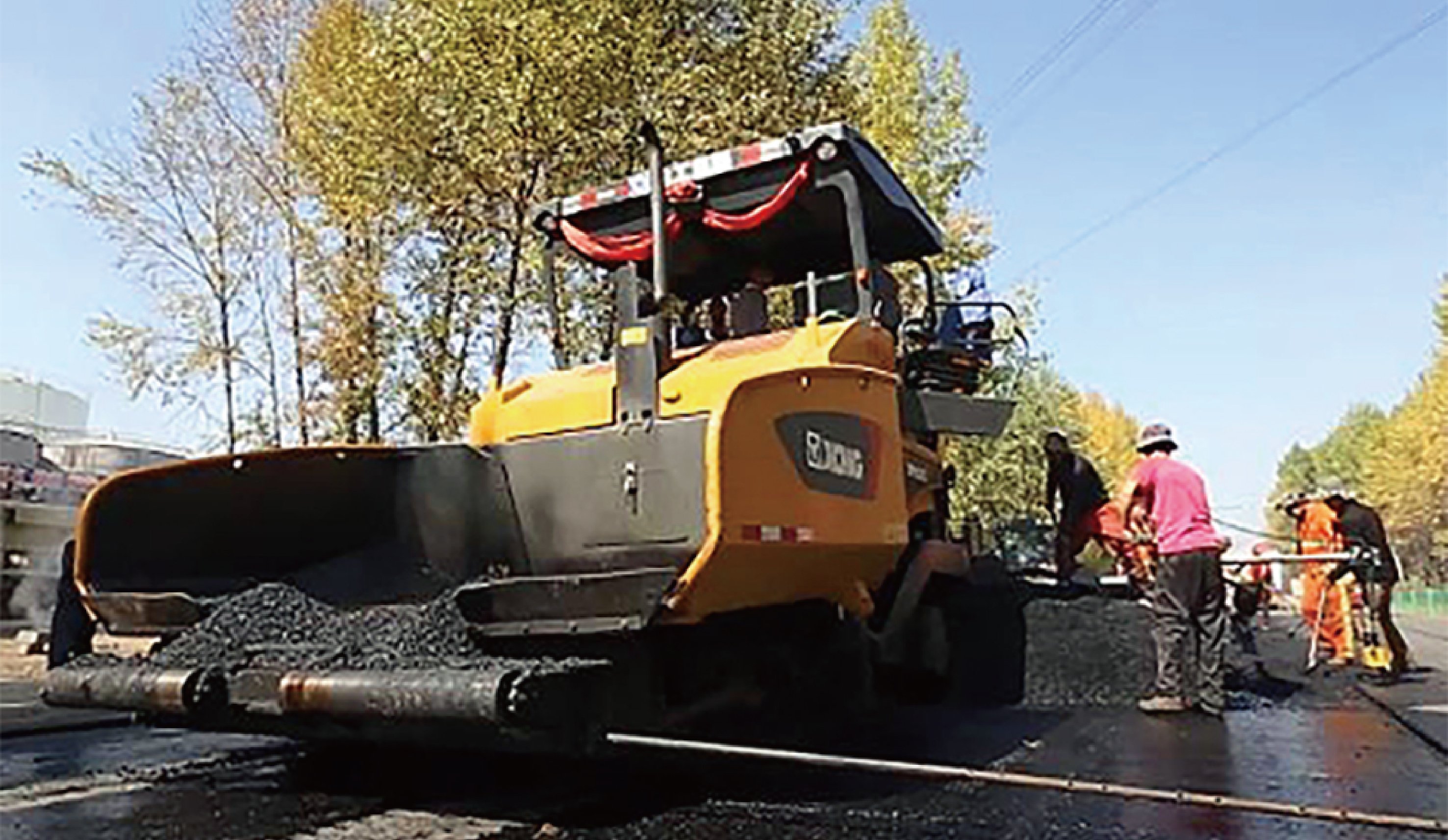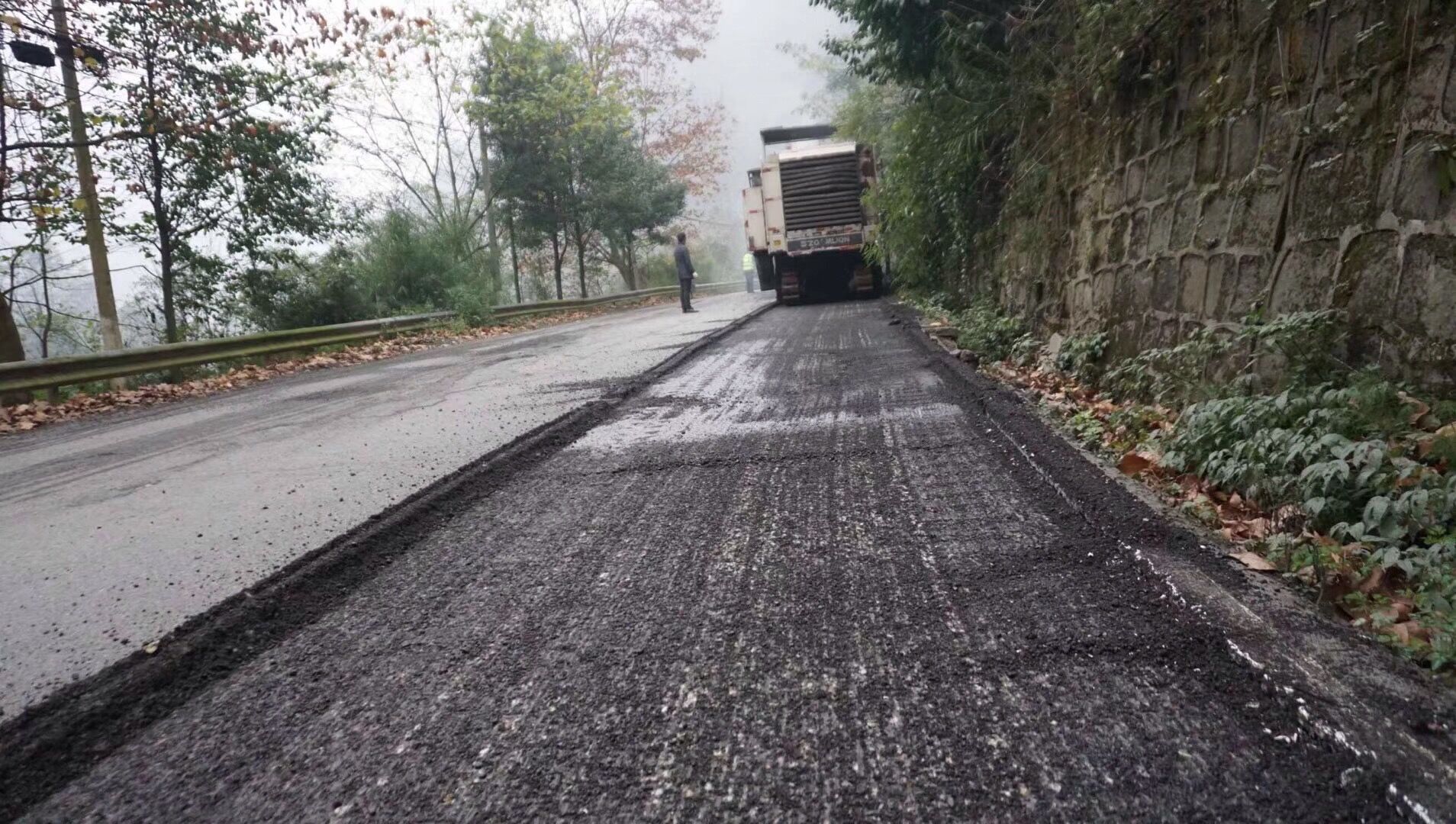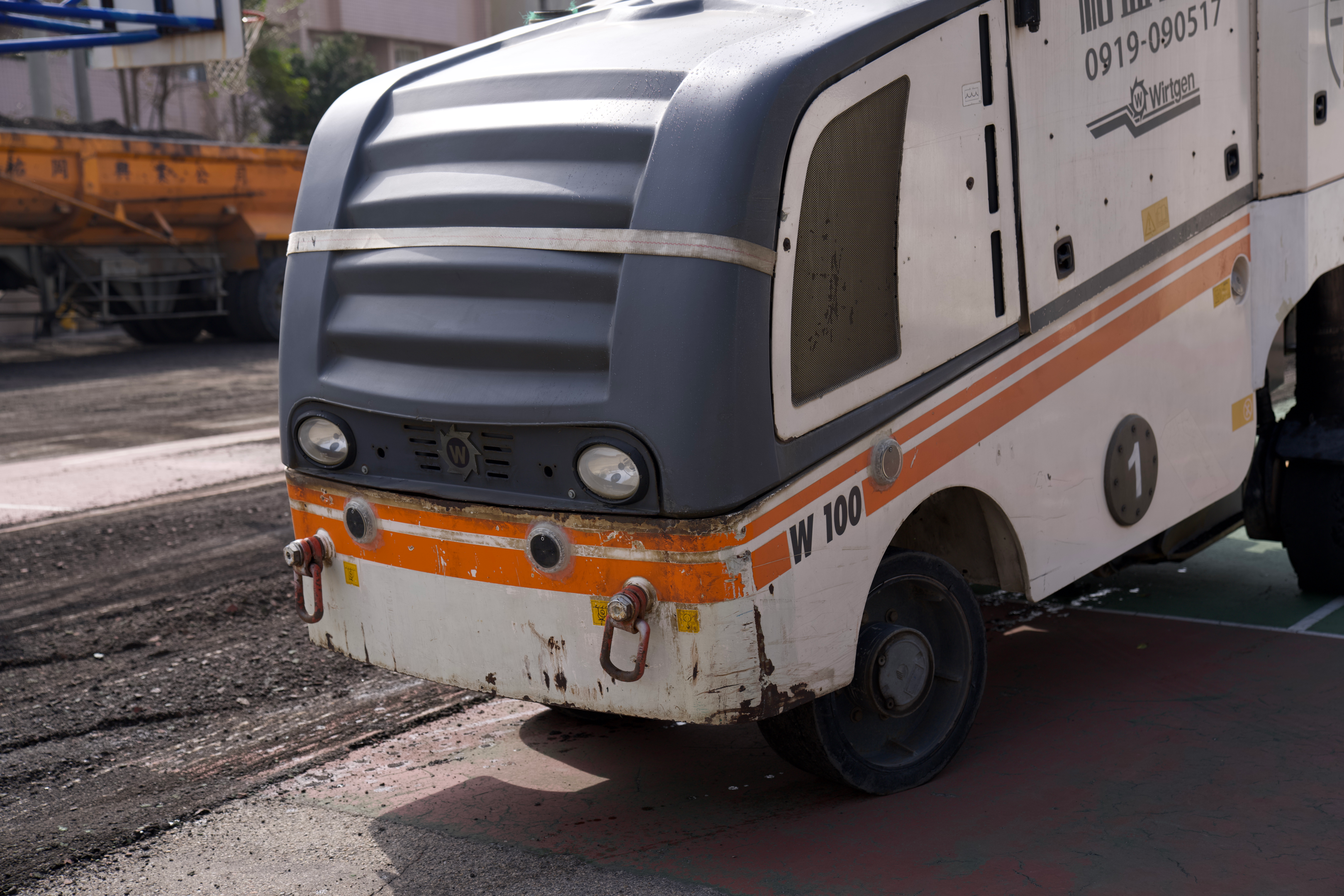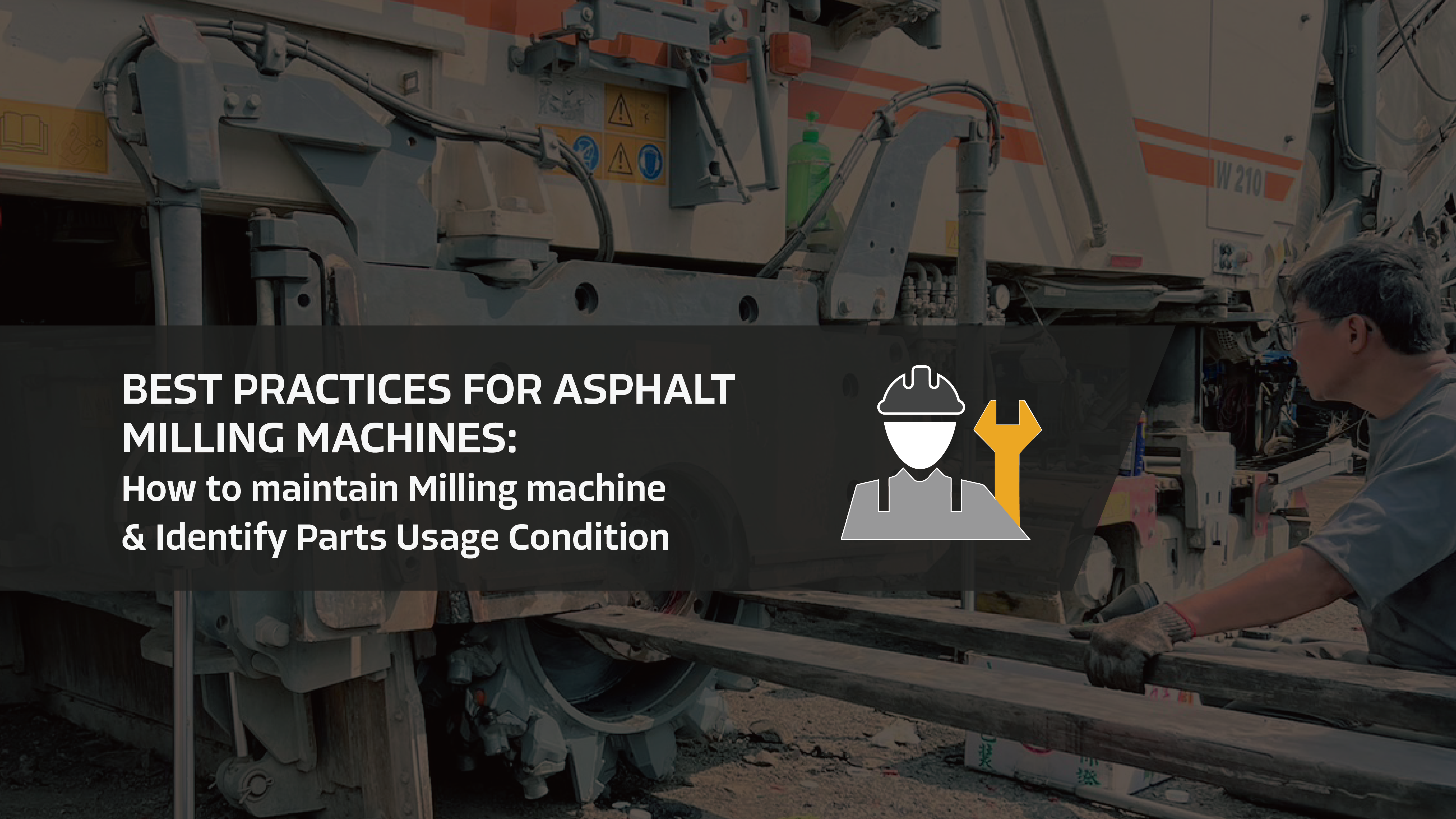In any road construction project, Paving is usually the crucial part and having the right equipment is essential for a smooth surface. From pavers and rollers to rakes and tampers, there are many tools that are necessary for properly paving a surface.
In this article, we will go over some of the essential tools every pro should have in their toolkit for paving asphalt surfaces. We'll cover everything from the basics like construction pavers and rollers to specialized tools like rakes and tampers - designed to help you easily create perfect asphalt pavement.
Table of content:1. Overview of Asphalt Paving3. Definition and explanation of the asphalt paver4. Types of Paving machines (e.g. tracked, wheeled)5. Key features to consider when choosing an asphalt paver6. Rollers7. Definition and explanation of rollers8. Types of rollers (e.g. vibratory, static)9. Key features to consider when choosing a roller11. Commonly Used Tools and Machinery in the Process
Types of Equipment Used for Paving Asphalt Surfaces
There are many tools involved in the paving process and each one has its purpose. From pavers and rollers to rakes and tampers, several pieces of equipment can be used for different stages of pavement construction.
Most pavers lay down the asphalt mix while rollers compact it into place. Rakes help smooth out any uneven surfaces before compaction takes place.
Tampers ensure that all new and existing pavement's surface area have been properly compacted after rolling.
These specialized pieces of machinery work together to create perfect asphalt pavement finishes with ease. With so many options available, choosing the best type of equipment for your project can make all the difference when it comes to achieving professional results every time you pave a surface.
Asphalt Pavers
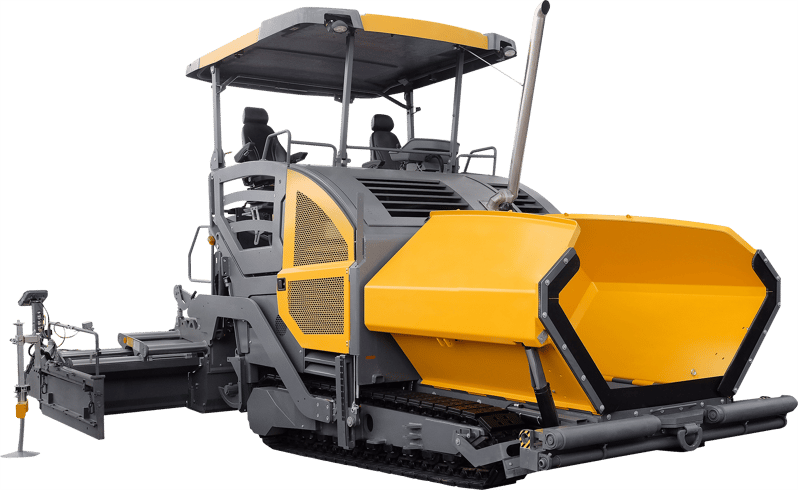
First, let's talk about asphalt pavers. It is construction equipment that is used to lay asphalt on roads, bridges, existing pavement, and other types of surfaces. It is of two types:
Tracked and wheeled pavers.
Tracked pavers are more versatile and can be used on a grooved surface, while wheeled pavers are best suited for smooth, paved surfaces. When choosing a paver, it's important to consider factors such as the size of the paving site, the type of surface, and your budget.
Process of Pavement:
Cold milling machines prepare asphalt for paving, it also helps to remove the top layer of the existing pavement. This is typically done to remove damaged or deteriorated old milled asphalt, and small rocks to help achieve a flat surface before laying new asphalt.
In this process, a dump truck can also be used as a material transfer vehicle. Dump trucks are used to unload the hot mix asphalt on the construction site. These dump trucks come in different types, There are end dump trucks and bottom dump trucks, ensure to use the right one to prevent future cracking. Bottom dump trucks unload the hot mix asphalt, other dump trucks may unload hot asphalt but quickly, due to instability.
Also, Cold milling machines use a rotating drum with teeth or cutting blades to remove the asphalt. The milled material is then collected and transported off the job site for disposal or reuse.
Once the milling process is complete, the hma surface is cleaned and prepared for paving. The paving machine is then used to lay the new asphalt, using a screed to smooth and level the ground contact area or final surface. The paver may also use a roller like an asphalt binder to compact the asphalt and ensure a smooth, durable finish.
What is Roller?
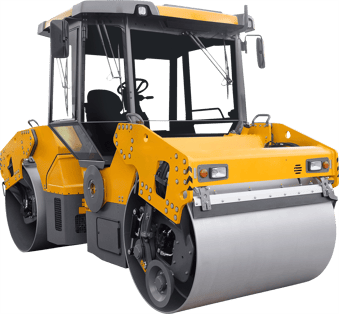
A roller is a construction machine that is used for HMA compaction (it reduces the volume of air in the Hot Mix Asphalt), There are two main types of rollers: vibratory rollers and static rollers.
Vibratory rollers use a vibrating drum to compact an asphalt material, while static rollers use weight and gravity to compact materials. Key features to consider when choosing a roller include the size and weight of the roller, the type of surface you will be working on, and your budget.
Other essential tools for paving asphalt surfaces include screeds and cutters. Screeds are used to smooth and level a distressed surface layer of the asphalt, while cutters are used to cut and shape the asphalt. These tools are usually smaller and more specialized than other equipment, so it's important to choose the right ones for your specific project.
Benefits of Using Professional Equipment for Paving Asphalt Surfaces
High-Quality Equipment
High-quality tools benefit both the asphalt contractors and their clientele. Paving requires the right equipment speed and precision, and professional tools help to ensure that the job is done correctly and quickly. It is usually of higher quality than those found in hardware stores, which means they are more durable, reliable, and often easier to use.
Better Results
It lays down asphalt mix with greater accuracy than hand-laid mix asphalt. while rollers compact it into place faster and with more even results.
Saves Time
Rakes can level out the top layer faster than manual leveling methods such as shovels or hand tampers.
Tampers ensure that all areas have been properly compacted after rolling and are essential for creating a smooth finish on a pavement surface. Asphalt cutters save time by allowing professionals to cut shapes accurately in asphalt as needed.
Finally, using high-quality screeds helps create a perfectly even surface finish every time - something that cannot be replicated manually. Professional tools help to maximize efficiency when laying pavement surfaces, ensuring cost savings for customers without sacrificing quality or safety standards.
Tips on Maintenance and Repair of Asphalt Paving Equipment
Proper maintenance and repair of the paving tools are essential for ensuring that your tools are in good working condition and can perform at their best.
This includes regularly cleaning and lubricating your equipment, as well as performing regular inspections to identify and fix any potential issues. It's also important to have a maintenance schedule in place to ensure that your equipment is getting the care it needs.
Repair Damages Early
It is important to repair any damage or wear and tear on your equipment as soon as possible to prevent further issues. This may include replacing worn or damaged parts or taking the equipment to a professional for more extensive repairs. This will help extend its lifespan and ensure that it is ready to handle any job you throw its way.
1. Clean and lubricate equipment regularly
2. Perform regular inspections to identify and fix potential issues
3. Have a maintenance schedule in place
4. Use only high-quality parts for repairs
5. Consider hiring a professional for more extensive repairs
6. Store equipment properly to prevent damage
7. Follow the manufacturer's guidelines for maintenance and repair
8.Keep a record of all maintenance and repair activities for reference
9. Regularly calibrate and test equipment to ensure it is in good working condition.
The 10 Most Commonly Replaced Parts When Undergoing Asphalt Paving Project
The parts below can wear over time, especially if you are constantly using the machine.
Screed Plates
Paver screed are the plates that form the surface of the screed and come into contact with the asphalt. They can wear down over time due to abrasion from the asphalt.
Auger flights
The auger flights are the spiral-shaped blades that transport the asphalt from the hopper to the screed. They can wear down due to the abrasive nature of the asphalt and the constant movement of the auger.
Conveyor chains
The conveyor chains are a material delivery system used to transport the asphalt from the hopper to the auger. They can wear down due to the abrasive nature of the asphalt and the constant movement of the chains.
Wear plates
These plates are used to protect the underside of the paver from the abrasive nature of the asphalt. They can wear down over time and need to be replaced.
Screed wear bars
These bars help to smooth and level the asphalt as it is being laid. They can wear down due to the abrasive nature of the asphalt and the constant movement of the screed.
Paver tracks Chain
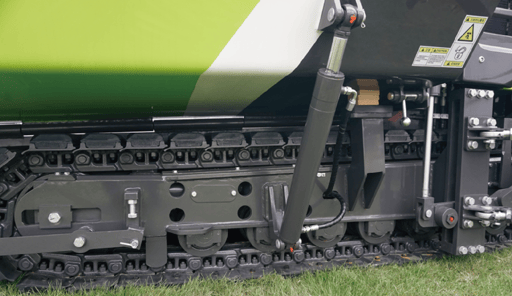
The tracks on a paver can wear down due to the weight of the machine and the abrasive nature of the asphalt.
Paver rubber track pads
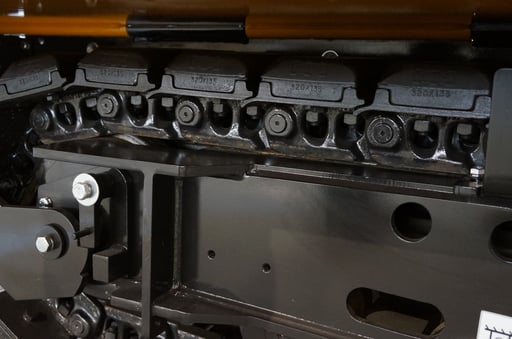
Paver rubber track pads are an essential component of a paver that provides stability, traction, noise reduction, extended machine lifespan, better fuel efficiency, better quality of paving, and enhanced mobility.
Paver sprockets
The sprockets on a paver can wear down due to the constant movement of the tracks.
Paver rollers
The rollers on a paver can wear down due to the constant compaction of the asphalt.
Cost Considerations when Buying or Renting Asphalt Paving Equipment
Making a New Purchase or Renting?
As you factor in cost before buying or renting the equipment, it is important to take into account the initial purchase price and any associated maintenance costs that come with it. Purchasing a new Asphalt Paving machine can be expensive up front, but will typically provide more longevity in terms of use and overall quality. On the flip side, renting can be a more cost-effective option if you are only looking for short-term usage, as you don’t have to shoulder the full costs of ownership.
However, Asphalt Paving machine rentals may include additional fees for maintenance and wear and tear, which should also be taken into consideration when making your decision. As such, weighing the pros and cons of both buying and renting this road construction equipment is key to finding the option that best suits your budget and needs.
Overall Cost of Operation
Other factors which may affect the overall cost include:
-
Fuel efficiency ratings
-
Size requirements
-
Labor costs associated with operating the machinery
-
Additional safety protocols or certifications needed to operate on certain sites or with certain materials.
Lookout for the Features
Depending on the type of Paving machine you are looking for there may also be features available that could add extra value such as automated mapping capabilities or enhanced control options.
By researching ahead of time on these types of features in combination with their respective costs you can help ensure a successful project without breaking your budget.
In conclusion, having the right paving machine is crucial for a successful project. From pavers and rollers to rakes and tampers, many tools are necessary for properly paving a surface. It's important to do your research and choose the best tools for the job, based on factors such as the size of the project, the type of surface you will be working on, and your budget. Having the right equipment ensures that your paving projects are smooth, professional, and successful.
FAQ
Q: What is Asphalt Paving Equipment?
A: These are tools and machines used to lay asphalt on roads, bridges, and other surfaces. This includes tools such as the paver, rollers, rakes, tampers, and screeds.
Q: Why is it Important to Have the Right Equipment for Paving?
A: Having the right equipment is crucial for a smooth, successful paving job. The right tools will ensure that the asphalt is laid properly and compacted correctly without having aggregate segregation, resulting in a durable and long-lasting pavement.
Q: What Factors Should I Consider When Choosing a Paver for Asphalt Surface?
A: Some factors to consider when choosing a paving machine include the size of the project, the type of surface you will be paving, and your budget. It's also important to consider the specific features and capabilities of the equipment, such as the size and weight of the tool and its suitability for different types of asphalt.
Q: How do I Maintain and Repair a Paver?
A: Proper maintenance and repair are essential for ensuring that your tools are in good working condition and can perform at their best. This includes regularly cleaning and lubricating your equipment, as well as performing regular inspections to identify and fix any potential issues. It's also important to have a maintenance schedule in place to ensure that your equipment is getting the care it needs. In addition to regular maintenance, it's also important to repair any damage or wear and tear on your equipment as soon as possible to prevent further issues.
Q: Can I use an Asphalt Paver for Other Types of Paving Projects?
A: Some paving machines, such as rollers and tampers, may be suitable for use on other types of paving projects. However, it's important to consider the specific requirements and characteristics of the project
.png?width=698&height=417&name=%E5%AE%98%E7%B6%B2logo%20(1).png)
